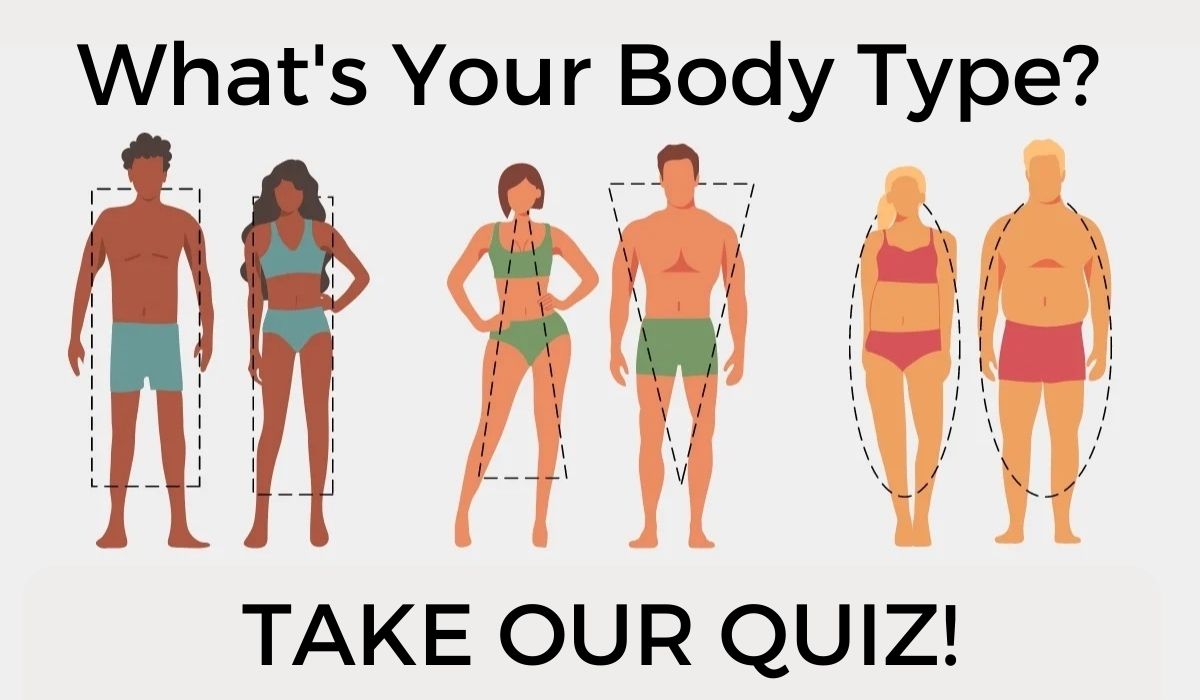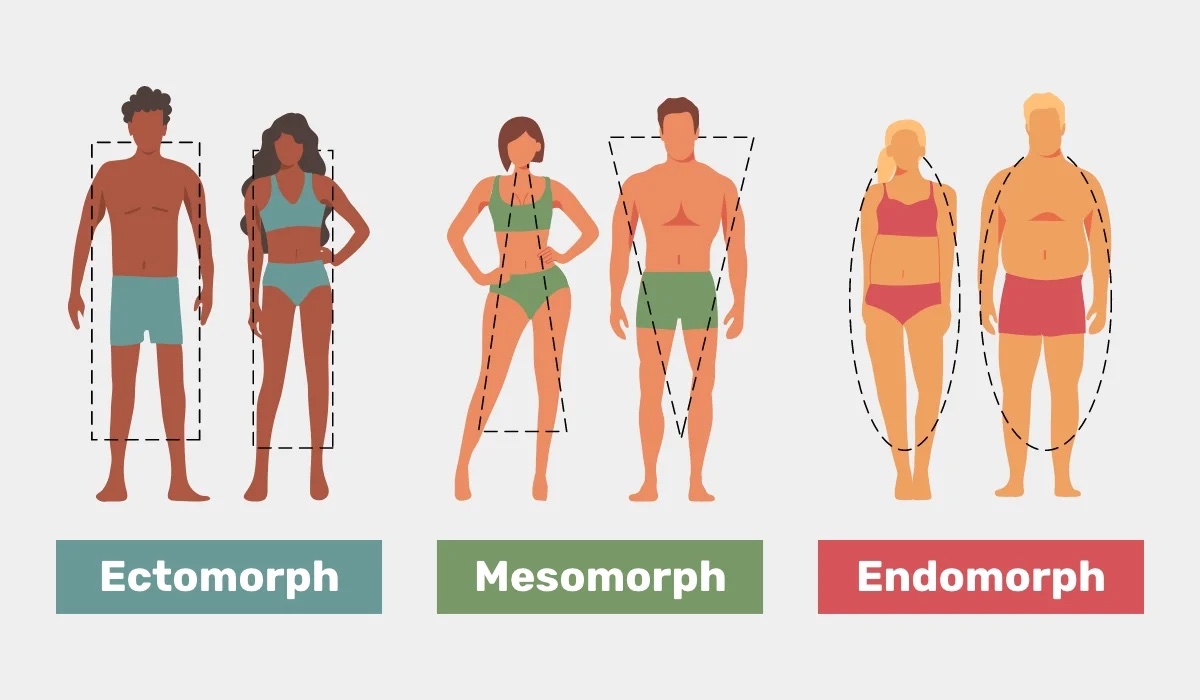Have you ever noticed that some people seem to be able to eat whatever they want and not gain weight, while others struggle to lose even a few pounds? Or that some people naturally have a more muscular build, while others are naturally thin? These differences are due to variations in body type, which can impact how easily you gain or lose weight and build muscle.
Firstly, welcome to our Body Type Quiz!
Welcome to our Body Type Quiz! Most importantly, understanding your body type – Ectomorph, Endomorph, Mesomorph – is essential for achieving your health and fitness goals effectively. It’s important to note that your body type is NOT an excuse; but rather a powerful tool on your fitness journey.
Drawing from my 29 years of experience as San Diego’s best personal trainer, individuals who view their body type as a limiting factor, using phrases like “It’s just the way my body type is” or “It’s just my genetics,” often face challenges in achieving their long-term health and fitness goals. However, those who embrace their body type as a valuable piece of the puzzle tend to experience greater success.
Understanding Body Type Influences
Furthermore, understanding the nuances of body types goes beyond mere physical appearance; it influences how we move, our posture, and even our cognitive performance. Individuals with different body compositions may exhibit distinct postural tendencies, movement patterns, as well as cognitive performance, shedding light on how physical characteristics may influence mental abilities. PMID: 36329775
Additionally, recent research has shed light on the association between body types and chronic diseases such as digestive system diseases, arterial hypertension, liver disease neuroses, and sciatica. These findings underscore the importance of body weight control and tailored fitness interventions based on one’s body type. PMID:12088094 DOI: 10.1515/reveh.2002.17.1.65
By knowing your body type, you can uncover the key to designing the right exercise and nutrition plan that will yield the best results for your unique needs. So, grab a pen to jot down your answers, and let’s get started!
Question 1: Which best describes your body frame?
- a) I have a lean and slender physique with narrow shoulders and hips.
- b) I have a soft and round body with a higher percentage of body fat.
- c) I have a naturally muscular and athletic build.
Question 2: How do you typically respond to a new exercise routine?
- a) I have trouble gaining weight and have little fat storage.
- b) I struggle to lose weight and might gain muscle, but it takes time.
- c) I tend to gain muscle easily and see results quickly.
Question 3: What is your metabolism like?
- a) My metabolism is high, and I struggle to gain weight even when eating a lot.
- b) My metabolism is slower compared to others.
- c) My metabolism is fast, and I can eat without gaining much weight.
Question 4: How do you gain or lose weight?
- a) I have difficulty gaining both muscle and fat, no matter how much I eat or exercise.
- b) I gain weight easily and find it hard to lose.
- c) I gain weight easily, but I can also lose it quickly with exercise and diet adjustments.
Question 5: What is your energy level throughout the day?
- a) I have steady energy levels, but they are not exceptionally high.
- b) My energy levels fluctuate, and I often feel fatigued.
- c) I have high energy levels and rarely feel fatigued.
Question 6: How would you describe your appetite?
- a) I have a relatively low appetite and might forget to eat at times.
- b) I have a strong appetite and struggle to control it.
- c) I have a hearty appetite and can eat a lot without gaining weight.
Question 7: How do you usually store weight?
- a) I struggle to gain weight and have little fat storage.
- b) I tend to store weight in my midsection, hips, and thighs.
- c) I store weight evenly throughout my body.
Question 8: How do you handle stress?
- a) Stress often causes me to lose weight or makes it challenging to gain.
- b) I tend to eat more when stressed, leading to weight gain.
- c) I handle stress well and don’t see a significant impact on my weight.
Upon completing the quiz, let’s explore the results:
- If the majority of your answers are (a): You would be classified as an Ectomorph! You have a lean and slender physique with difficulty gaining weight. You’ll benefit from a diet rich in nutrients and a well-designed resistance training program.
- If the majority of your answers are (b): You would be classified as an Endomorph! You have a higher percentage of body fat and may gain weight easily. Focus on a combination of strength training, cardio, and a balanced diet to achieve your fitness goals.
- If the majority of your answers are (c): You would be classified as a Mesomorph! You have a naturally muscular and athletic build. You can focus on a balanced exercise routine and a diet that supports muscle growth and overall health.
The 3 Body Types Further Explained
Ectomorphs
Ectomorphs are typically thin with a narrow frame, long limbs, and low body fat. They often struggle to gain weight or muscle and may have a faster metabolism. If you are an ectomorph, your fitness and nutrition plan should focus on building muscle mass and strength.
Fitness Programming: Ectomorphs should focus on compound exercises that target multiple muscle groups and allow for heavier weights, such as squats, deadlifts, bench press, and pull-ups. Aim for 3-4 strength training sessions per week, with a focus on progressive overload (gradually increasing the weight or reps over time). Incorporate some cardio to improve overall fitness and heart health, but don’t overdo it as too much cardio can make it harder to build muscle.
Nutrition Guide: Ectomorphs should aim to eat a calorie surplus to support muscle growth. Aim for a balance of carbohydrates, protein, and healthy fats, with a focus on whole foods. Eat enough protein (around 1 gram per pound of bodyweight) to support muscle repair and growth. Consider adding in healthy sources of fats, such as nuts, seeds, and avocado, to increase calorie intake. Don’t be afraid of carbs, as they provide energy for workouts and help with muscle growth.
Endomorphs
Endomorphs have a larger frame and a higher body fat percentage, with a tendency to gain weight easily. They often have a rounder shape and carry weight around their midsection. If you are an endomorph, your fitness and nutrition plan should focus on losing fat and improving overall health.
Fitness Programming: Endomorphs should focus on a mix of cardio and strength training to promote weight loss and build muscle. Incorporate both low-impact cardio (such as the stairmaster) and HIIT to maximize fat burning. Aim for 3-4 strength training sessions per week, focusing on compound exercises and progressive overload. Incorporate some form of cardio in each session to boost overall calorie burn.
Nutrition Guide: Endomorphs should aim to eat a calorie deficit to promote weight loss. Focus on lean protein sources (such as chicken, fish, and tofu), healthy fats (such as nuts, seeds, and avocado), and fiber-rich carbohydrates (such as fruits, vegetables, and whole grains). Avoid highly processed foods and added sugars, which can contribute to weight gain. Consider tracking your calories and macros to ensure you are in a deficit, but don’t cut calories too drastically, as this can negatively impact muscle growth and energy levels.
Mesomorphs
I always say that Mesomorphs have the best of both types. Mesomorphs have a medium to large frame and a muscular build, with broad shoulders and a low body fat percentage. They often have an athletic, proportionate body shape and can easily gain or lose weight depending on their diet and exercise routine. If you are a mesomorph, your fitness and nutrition plan should focus on maintaining muscle mass and overall fitness.
Fitness Programming: Mesomorphs should focus on a balanced mix of strength training and cardio. Incorporate compound exercises for strength and muscle growth, but also include some high-intensity interval training (HIIT) and steady-state cardio for overall fitness. Aim for 3-5 strength training sessions per week, with a focus on progressive overload, and 1-2 cardio sessions per week.
Nutrition Guide: Mesomorphs should aim to eat a balanced diet with a moderate calorie intake to support their overall fitness and maintain muscle mass. Aim for a balance of carbohydrates, protein, and healthy fats, with a focus on whole foods. Eat enough protein (around 1 gram per pound of bodyweight) to support muscle repair and maintenance. Don’t cut out any major food groups, but focus on healthy sources of carbohydrates (such as fruits, vegetables, and whole grains) and healthy sources of fats (such as nuts, seeds, and avocado).
Finally, knowing your body type is the first step towards achieving your health and fitness goals. By understanding how your body responds to exercise and nutrition, you can make informed decisions to live a healthier and happier life. But remember, everyone’s body is unique, and these are general guidelines. To discuss your quiz results and for a more personalized fitness and nutrition plan, contact me to schedule your free initial consultation and start your fitness journey today!






